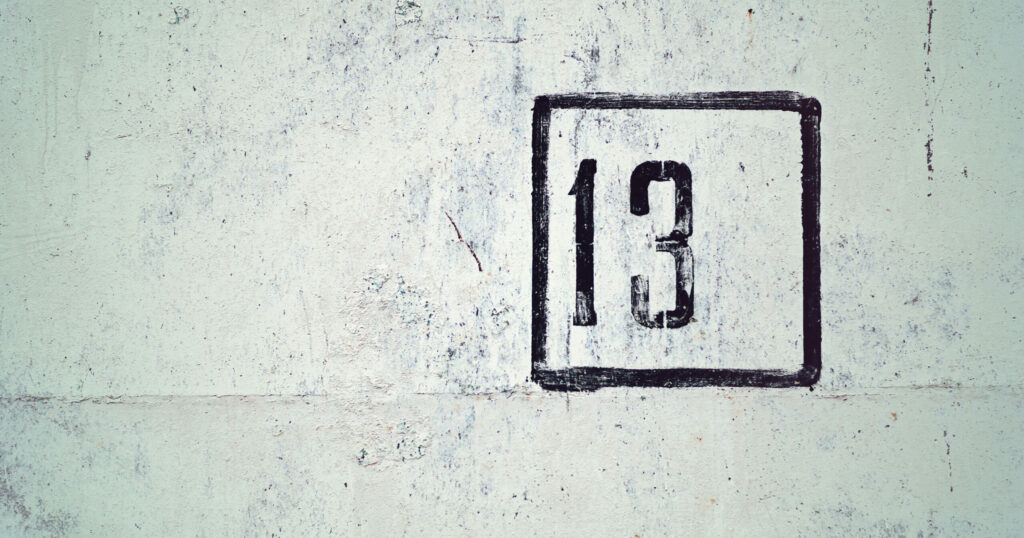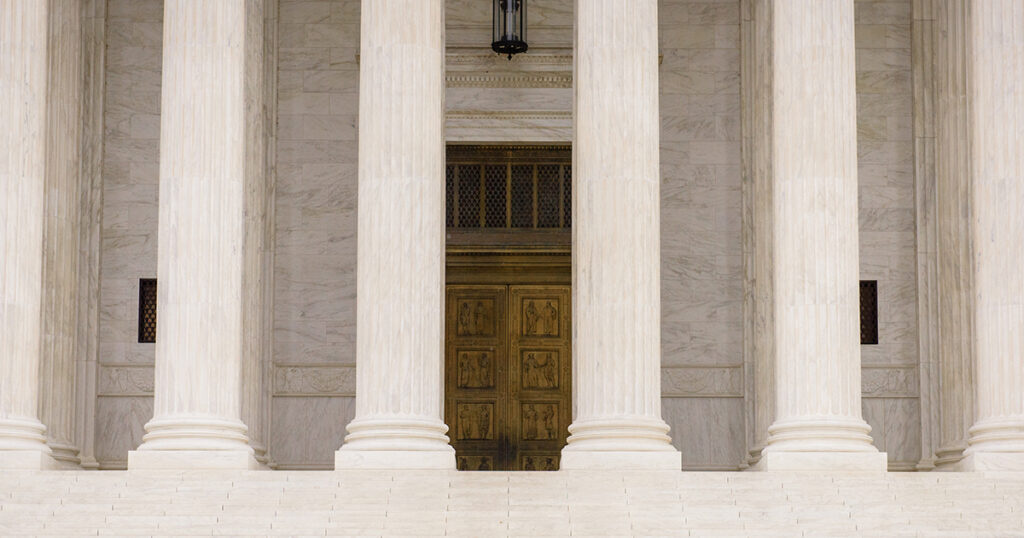We live in a world where scientism and materialism have triumphed — a world where science (whatever that is) is immutable and the utmost authority, and what can be seen and weighed and used is the only thing that is “real,” or that we can place any confidence in.
Or do we?
Amid a culture that prides itself on rationality, superstition lingers on. Indeed, some superstitions have a stronger foothold than ever before in the popular American consciousness. Let’s look at a few of the superstitions that have lingered from age to age.
Fingers crossed
Many of the superstitions familiar to us have to do with attracting “good luck” and warding off “bad luck.” Take the tradition of crossing one’s fingers before doing something one hopes will go well.
According to many tales, this superstition is Christian in its origins. Early Christians in Rome, during the years of persecution, would form the symbol of the ichthys (fish) by crossing their thumb and index finger to identify themselves subtly to fellow Christians.
Whether or not this is the true origin of the current superstition, its modern resurgence seems to have come about in the late 18th and early 19th centuries. A 1787 book of English proverbs and superstitions advised its readers to keep their fingers crossed after walking under a ladder to avoid bad luck until they saw a dog, which would restore their luck.
In a slightly less pious adaptation, fingers are crossed behind one’s back while telling a lie that one hopes to get away with, or while making a false promise. This variation is also commonly explained as Christian in origin: an attempt to gain forgiveness for the lie being told or the promise about to be broken.
The “fingers crossed” symbol and phrase are still culturally relevant enough to have merited a place on Apple’s emoji keyboard. A similar Christian symbol — the sign of the cross — can also be used superstitiously, such as when an athlete makes the sign of the cross before launching into a play or after successfully completing one.
Knock on wood
The tradition of knocking on or touching wood to bring good luck or ward off bad luck is so common that the phrase “knock on wood,” just like “fingers crossed,” has become an idiom. Like crossing one’s fingers, there are various tales of this superstition’s origins.
According to some, the tradition has its roots in the ancient Celtic belief that good spirits resided in trees. A Christian origin story links the tradition to the wood of the cross. Still others claim that the tradition harkens back to the praying of rosaries in the Roman Catholic tradition, which were often made of wood.
The Oxford English Dictionary, however, traces the phrase back to the 19th century children’s game “Tiggy Touchwood,” in which participants could become “exempt from capture [by] touching wood.” And indeed, there seems to be no record of this phrase’s presence in the vernacular at any time more ancient than this.
Horseshoes
Horseshoes have traditionally been considered good luck when hung above the front doors of homes. This superstition has its roots in the story of a 10th-century Irish saint named Dunstan. Despite a wealth of variations of this story, all tell of the fateful day when the devil asked St. Dunstan, who was a blacksmith, to make him a horseshoe to shoe his cloven foot. A Christian man, Dunstan agreed but took a red-hot horseshoe straight from the fire and nailed it to the devil’s hoof. Dunstan refused to remove it until the devil agreed never to enter a home where a horseshoe was hung above the door.
While the story that gives rise to this superstition is clear, and it has indeed been around for centuries, the modern roots of this superstition’s popularity come from the 19th century, when Edward G. Flight popularized the story through his 1871 lyric poem The Horse Shoe: The True Legend of St. Dunstan and the Devil.
Friday the 13th
Traditions of “bad luck” also remain familiar to us. Our culture’s negative associations with Friday the 13th were cemented by the “Friday the 13th” movie series of the 1980s, and the franchise that has continued from it.
As with “good luck” traditions, there are many accounts of the ancient origins of this tradition. One points out the ancient mistrust of the number 13 across many Western cultures. Another elaborate account connects it to Maundy Thursday, when 13 gathered together to eat the Last Supper, on the night before Good Friday. Since Judas was always listed last, he was the 13th member at the Last Supper, and hence the association with “bad luck.”
Nonetheless, most of the references to the bad luck of this particular intersection of day and date begin in the 19th and early 20th centuries, particularly following the publication of Thomas William Lawson’s 1907 novel Friday, the Thirteenth, especially after a bizarre coincidence in which a ship named after Lawson, the Thomas W. Lawson, was wrecked later that year, on Friday, Dec. 13.
Destiny in the stars
If the superstitions listed up to this point seem old-fashioned or are practiced only with a wink, others are embedded deeply in our contemporary culture, and many people view them with enough sincerity and confidence to make entire belief systems out of them.
One set of superstitions commonly targeted by Christians is astrology and horoscopes, which have become such an industry that Co-Star, an app that updates its users daily with their “hyper-personalized, real-time horoscopes,” consistently ranks as one of the top-downloaded apps in Apple’s App Store. According to a Pew Research study from 2018, 32% of Americans ages 18–29, and 34% of Americans ages 30–49, believe in astrology — a number not too far from the 56% of U.S. adults who say they “believe in God as described in the Bible.”
The obsession with horoscopes is fueled in part by the contemporary obsession with personality and identity, which has also led to the popularity of personality classification systems such as Myers-Briggs. Unlike personality tests, which grow out of the observation of human behavior, astrological signs and horoscopes are a completely bogus enterprise without even the most tenuous connection to the laws of God’s creation. In a culture that ostensibly grounds its sense of truth in “science,” it is striking that these arts do not even pretend to have a basis in observation of the world. Vaguely ancient and vaguely pagan, they are a farcical enterprise rooted in the entertainment industry and mass media.
And yet, somehow, the faith in astrological signs as some sort of fundamental reality has become more socially acceptable in pop culture than faith in the existence of the one true God. Most U.S. adults could probably tell you their astrological sign. I could tell you mine.
Our magical minds
Another superstition has made the rounds for decades in various repackaged forms and is embedded in the cultural vernacular. It is the idea of “manifesting” one’s desires and aims “into the universe” to bring them to fruition.
This superstition was popularized a decade and a half ago through Rhonda Byrne’s book The Secret and the release of a corresponding film. The book quickly became a best seller, and the idea of manifesting remains popular today. The core of this superstition is that if one puts his or her aspirational thoughts out into the universe directly and concretely, these aspirations will come to be. Christian forms of this superstition emerged with the rise of the “prosperity gospel.”
The superstition of manifesting has seen a huge resurgence in popularity during 2020’s COVID-19 quarantines, with major influencers on platforms such as YouTube and TikTok creating tutorials on how to manifest your future, including a recent trend of “scripting” — writing down a desire over and over again — and then sharing the results when it is successfully manifested. Between March and July 2020, Google search results for “manifesting” spiked 669%.1[1] Interestingly, the top related topic in Google’s search analytics is “sin,” with the top related query being, “is manifesting a sin?”
And while this superstition is alive and well, its roots can be traced back to — you guessed it — the 19th century, when the New Thought movement exaggerated the powers of the human mind to manifest its own desires through concentrated thought and intention.
Searching for something more
Almost all of these “ancient” superstitions familiar to us today, while myths trace them back centuries, have their modern origins in the 19th century, the age of Marx, Freud, Nietzsche and Darwin, when Europe was in the throes of secularization. As secularism and the “disenchantment of the world” began to gain a foothold, a reaction of vague spiritualism and a fascination with the ancient and the supernatural arose. Since the 1960s in America, we see a similar spike in new superstitions that harken back vaguely to ancient sensibilities.
The various, largely mythical origin stories of so many superstitions are telling: We want to be doing something ancient, something that has meant something for a long time, something that makes sense of the matter around us.
In our day-to-day lives, the cold idea that there is no meaning to one action or life over any other, that what befalls us, good or bad, is blind chance, guided only by the ruthless jaws of natural selection or human caprice, does not sit well.
And neither, it turns out, does the idea that “the meaning of life is what you make it.” We crave something higher than ourselves, something old, something cosmic.
If our society has finally discovered the real truth about things, if science gives us all the answers, then why are humans not satisfied with those answers? If life is meaningless, then why have people in all times had a natural desire to find meaning in the world around them and craved a meaning that applies not only to their own lives, but lasts from age to age?
Thus the various superstitions our culture embraces show clearly the lie of a world without God. Even as society tries to reject Him, they cannot give up their innate knowledge that there is “more out there.” Tragically, they fashion their own gods to fill this void, gods who cannot guide them, love them or save them.
Faith and superstition
The history of Christianity includes many instances of the ways in which superstitions can become false grounds of confidence and a great harm to the Gospel. We must continually remind ourselves that true confidence is rightly placed only in God and His Word.
Some Christians choose out of piety to avoid saying “good luck” and to steer clear of any such superstitions. Others practice them without a second thought. But either way, we should not allow ourselves to treat with frivolity those false superstitions that are living and active in our day and, for many, amount to foundational realities.
While the persistence of superstition among our ostensibly science-conforming neighbors shows that their worldview is inherently lacking, we should make no mistake: The systems they create to fill this void are not thereby true. True confidence and hope rests only in Christ Jesus, who suffered and died that we might have life in Him.
[1] Jennings, “Shut up, I’m manifesting!” vox.com.







Blind Faith in modern medicine as the “cure all” for all our diseases and sickness is the new modern day superstition. As if our Creator , who is Jesus, didn’t design our immune systems good enough and it now takes Faith in science instead of thankfully to use His created gifts of natural nutrition to build our inate (natural) immune systems
I have none of them I have Faith nor Jesus Christ of Nazarene as my personal savior I l talk to him about everything I let the nonbelievers who I do not know believe it the superstitious things if meet people I will do my best to till them and Jesus